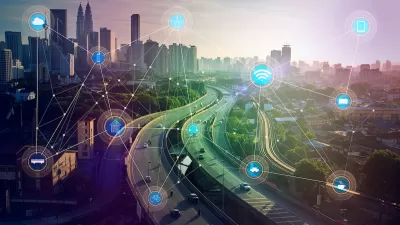Proptech (a portmanteau of property and technology) promises to change the world of development and planning.

Property technology, or proptech, involves the blending of information technology and real estate, creating platforms such as web interfaces, apps, and tech tools that aid in planning and development processes.
The proptech movement is still in early stages throughout many parts of the United States, but it's set to make potentially significant changes soon.
1. It Could Help Find the Best Pieces of Available Land Faster
Artificial intelligence (AI) is often part of the proptech conversation. Although the specific uses of the technology vary, they generally involve using trained algorithms to evaluate data and make conclusions faster than humans could without help.
One emerging proptech option that features AI is called CityBidr. It's a property marketplace that uses more than 15 data sets and a machine-learning algorithm to determine the ideal uses for land more efficiently. More specifically, it can determine whether land is most valuable concerning its current permitted use or another one.
CityBidr can also help property owners determine the right times to sell to developers to maximize investments. In a case study mentioned on the company website, several parties who owned property near the site of a future light rail station discovered new development doubled the value of their homes.
This example is not the only way to apply AI to proptech, of course, but it's already gaining traction. When speaking to ATTOM Data to give material for a CityBidr case study, the company's CEO and co-founder Bryan Copley said multi-family developers particularly like using the CityBidr marketplace.to discover properties they might not be able to find listed on the market yet.
Copley continued by confirming that the CityBidr site facilitated nearly 15,000 proactive offers on off-market properties. Thanks to technological solutions like this one, real estate professionals have another effective resource they can use when hunting for the perfect piece of property to meet their needs.
2. It Could Streamline the Creation and Distribution of Property Plans
Numerous apps on the market shorten the time it takes to make property plans and distribute them to members of the development team or clients who have specific requests for features the finished property must have. Some of the apps give instant access to digital blueprints, which is particularly convenient when new construction crews and other building professionals begin working.
Other apps show site plans and provide people with a visual reference that contains things like the locations of trees or gardens, plus the planned places for terraces, parking lots, and more. Since apps allow quick information sharing among all responsible parties, instant content reduces any confusion and helps prevent mistakes.
These apps should also facilitate clear communications between developers and clients. People from outside the property sector often have trouble picturing the results of a project when it's still in the early stages. Pulling up information on an app could guide the content of the conversation and help property professionals answer any questions from clients as they arise.
3. It Could Lead to Superior Smart Cities
As the proptech movement gains momentum, so does the push toward making high-tech cities. Many of the smart cities in the works promise to have a full assortment of sensors, cameras and automated components that ease pain points for city managers while making the place safe, fun and fulfilling for its residents.
A recent report about smart cities in the Asia-Pacific region asked 30 experts from technology, government and real estate to weigh in about the role of proptech solutions in the development of smart cities. The conclusion was that integrating technologies into these cities could have positive effects, but all tech investments should support the needs and wants of citizens.
There's some amount of risk involved in making substantial investments in proptech solutions to help with the planning and development of smart cities, then subsequently adding additional high-tech advancements into the picture as a planned development starts to take shape. However, several apps exist to boost engagement and transparency between city officials and residents.
Most of them let people do things like report potholes or pay for parking. It's easy to imagine, though, how apps could play an instrumental role in helping urban developers optimize future smart cities.
Outside the United States, city planners in places ranging from Germany to Singapore are interested in using things like virtual reality, 3D geodata, and big data analysis to improve city planning. As the public continues showing an interest in increasingly high-tech cities, urban planners will frequently rely on proptech to bring the ideas to life.
4. It Could Help City Planners See Where Hidden Needs Exist
City residents can give input to help planners make decisions. Similarly, Internet of Things (IoT) sensors are helping the proptech movement thrive. People can provide feedback about things they frequently notice, such as persistent traffic jams in a specific part of a city or the fact that a section of a community that walkers often use doesn't have enough streetlights.
IoT technology helps dig deeper and reveal issues residents might not bring up themselves. For example, sensors can track the flow of traffic to see the direct links between people's movements and problems that improved planning could solve. In the Dutch city of Dordrecht, for example, IoT sensors gather data about which streets individuals travel on most often, how they use the public transit system, and how fast they move.
People don't pay attention to those things unless major slowdowns occur or a bus route goes out of service, for example. But, sensors can give city planners valuable input as the dwellers in a destination go about their daily lives.
The Proptech Movement Will Continue to Spark Changes
The examples here merely scratch the surface of what's possible with proptech for city planning purposes. People should notice even more relevant applications for it soon.

Alabama: Trump Terminates Settlements for Black Communities Harmed By Raw Sewage
Trump deemed the landmark civil rights agreement “illegal DEI and environmental justice policy.”

Study: Maui’s Plan to Convert Vacation Rentals to Long-Term Housing Could Cause Nearly $1 Billion Economic Loss
The plan would reduce visitor accommodation by 25% resulting in 1,900 jobs lost.

Planetizen Federal Action Tracker
A weekly monitor of how Trump’s orders and actions are impacting planners and planning in America.

Wind Energy on the Rise Despite Federal Policy Reversal
The Trump administration is revoking federal support for renewable energy, but demand for new projects continues unabated.

Passengers Flock to Caltrain After Electrification
The new electric trains are running faster and more reliably, leading to strong ridership growth on the Bay Area rail system.

Texas Churches Rally Behind ‘Yes in God’s Back Yard’ Legislation
Religious leaders want the state to reduce zoning regulations to streamline leasing church-owned land to housing developers.
Urban Design for Planners 1: Software Tools
This six-course series explores essential urban design concepts using open source software and equips planners with the tools they need to participate fully in the urban design process.
Planning for Universal Design
Learn the tools for implementing Universal Design in planning regulations.
Caltrans
Smith Gee Studio
Institute for Housing and Urban Development Studies (IHS)
City of Grandview
Harvard GSD Executive Education
Toledo-Lucas County Plan Commissions
Salt Lake City
NYU Wagner Graduate School of Public Service






























